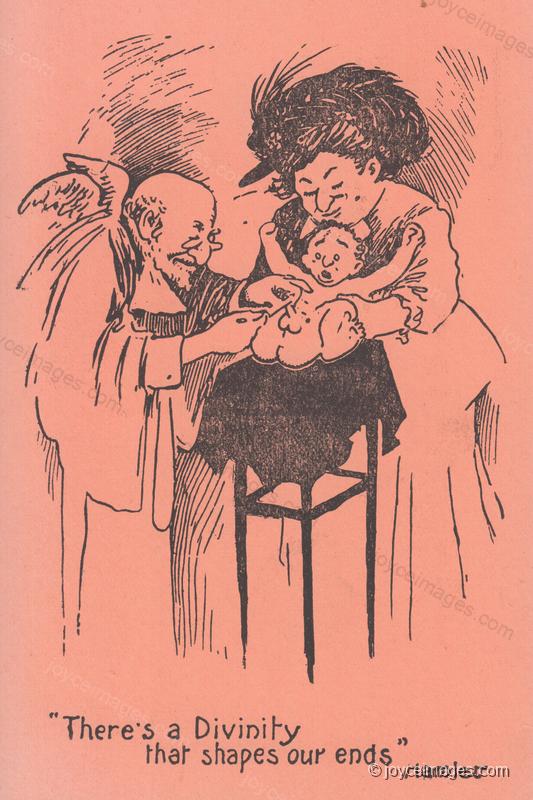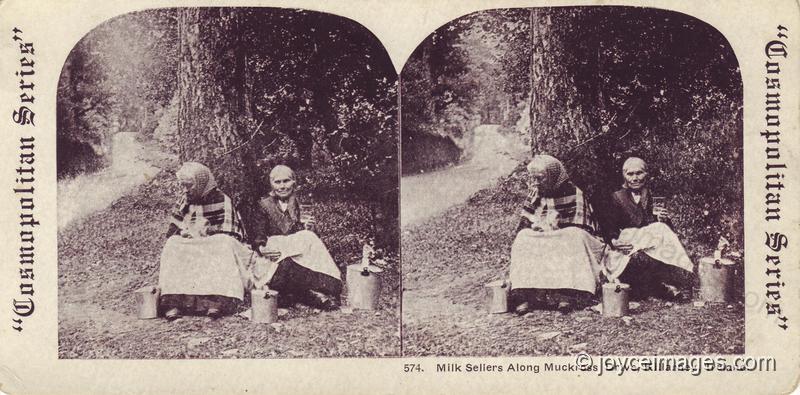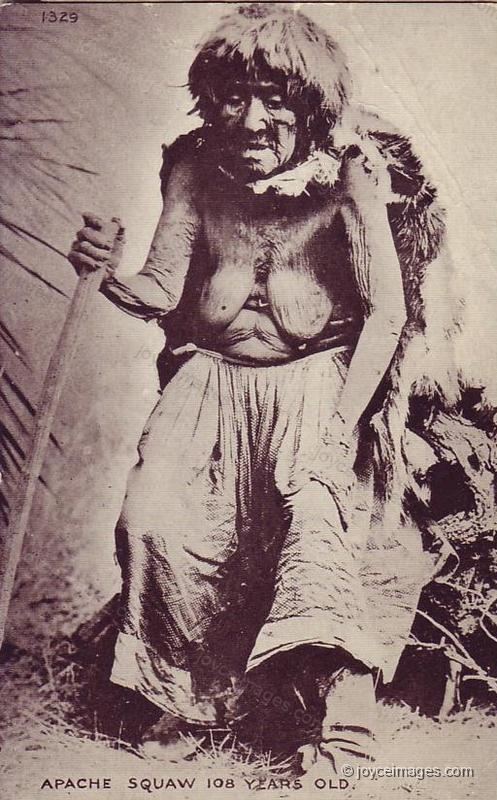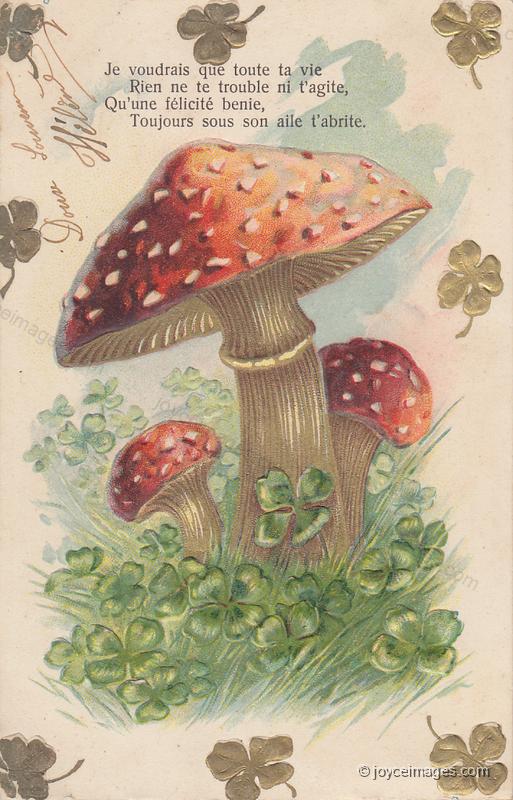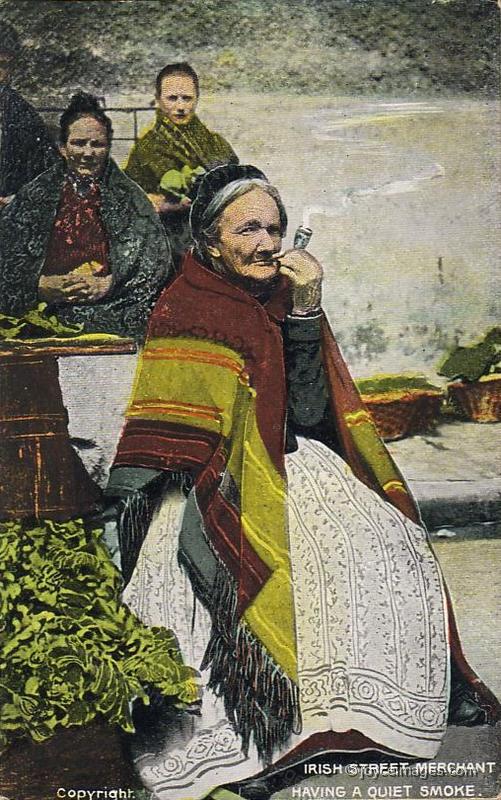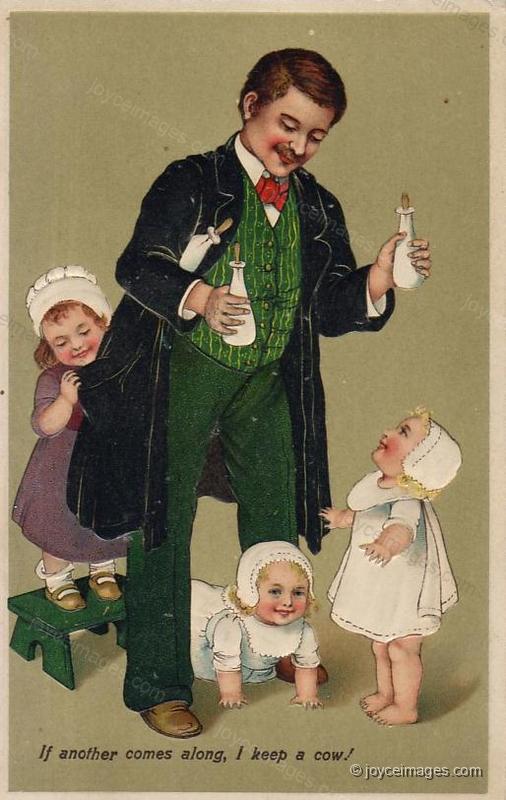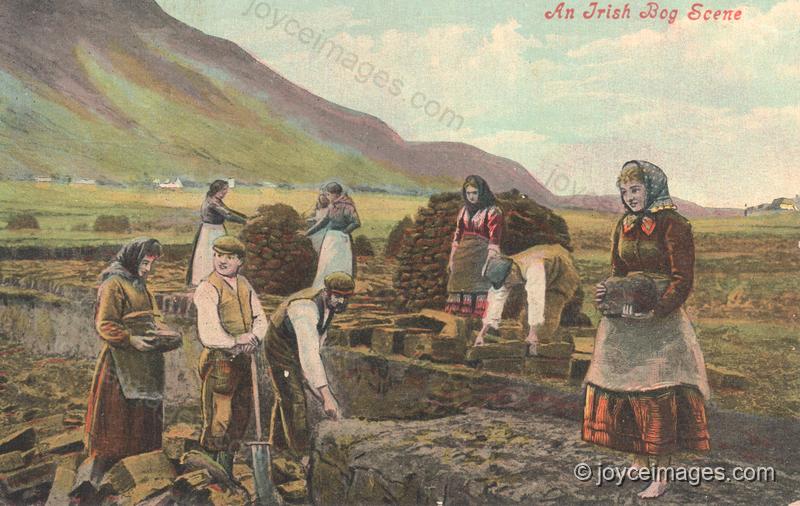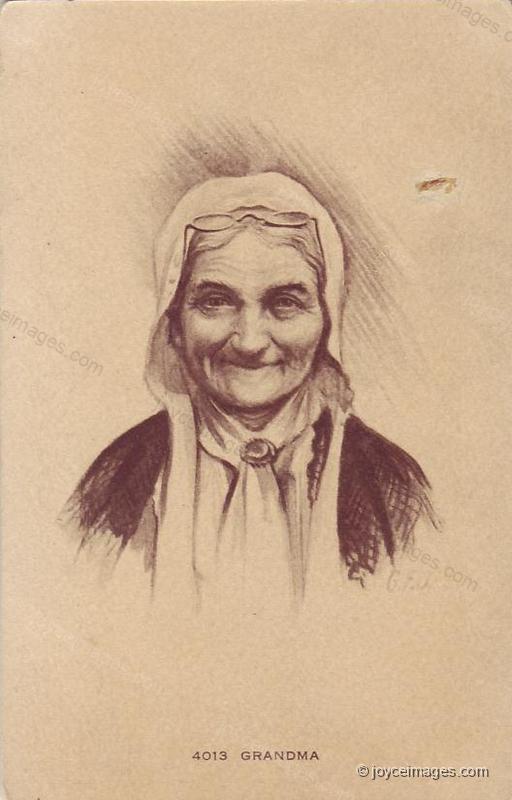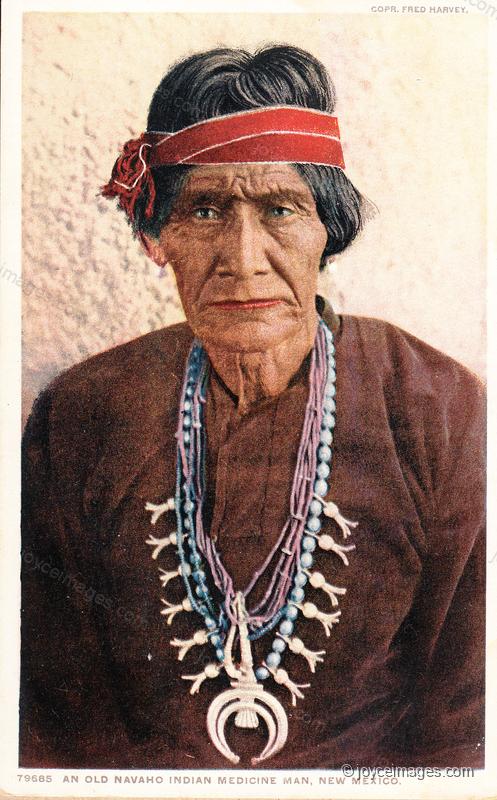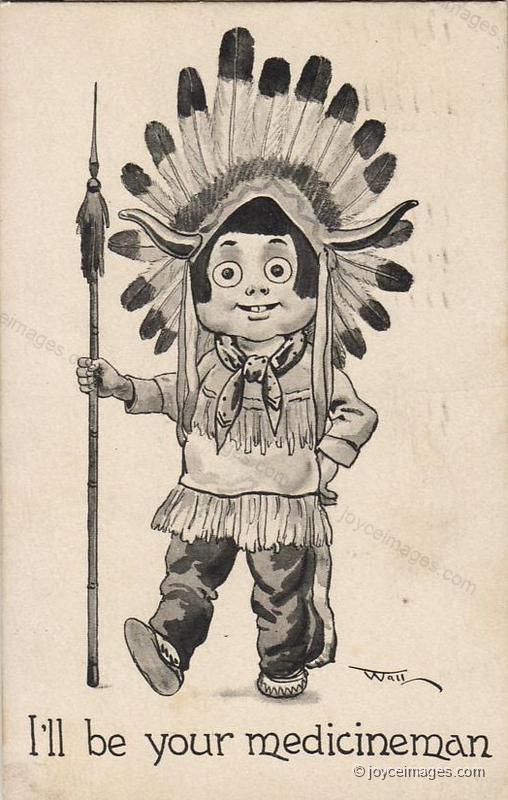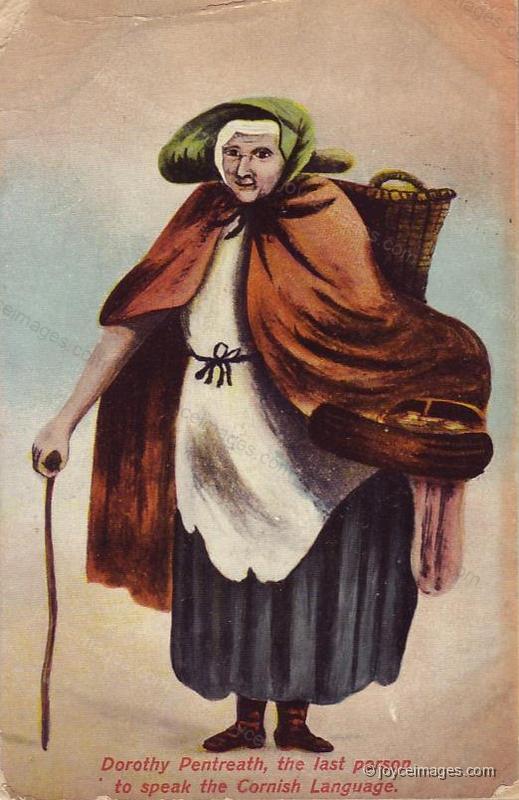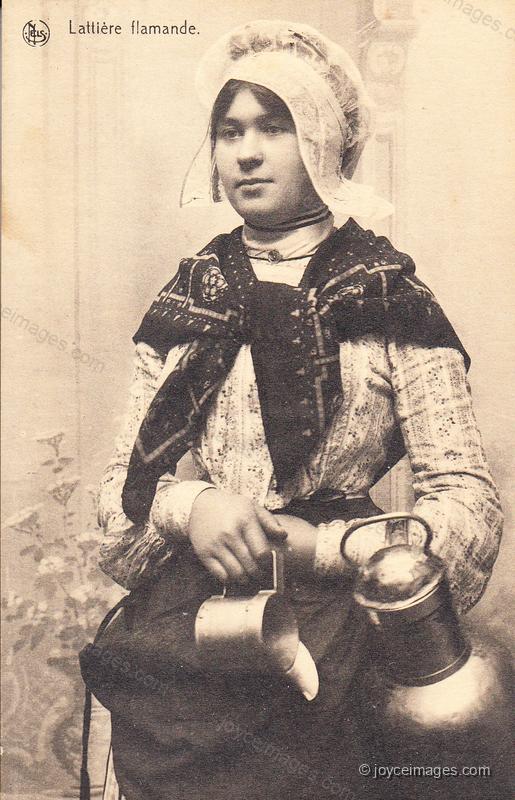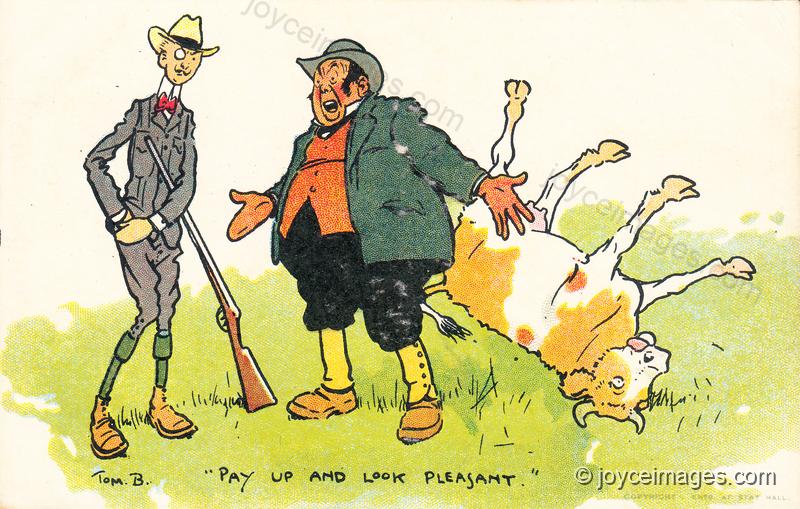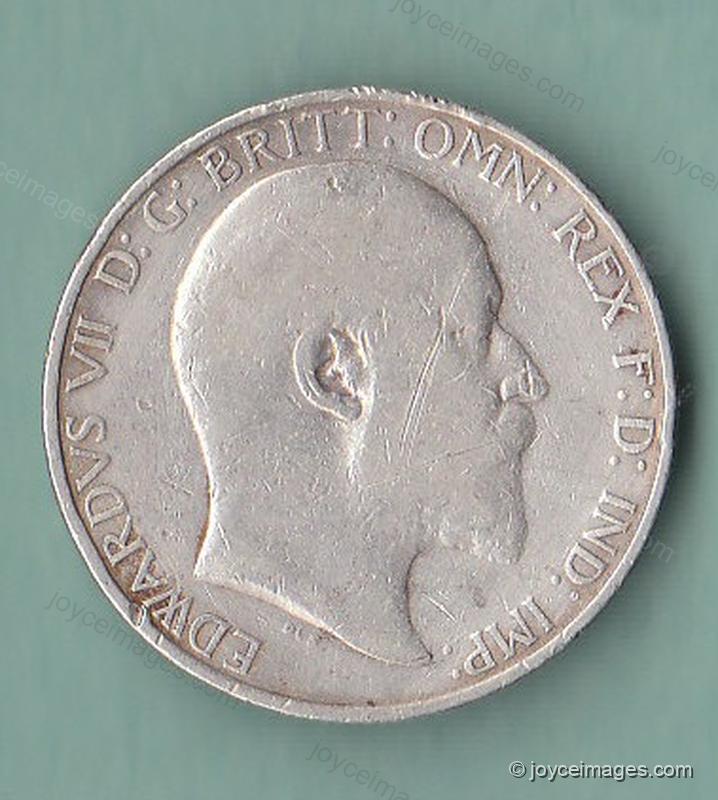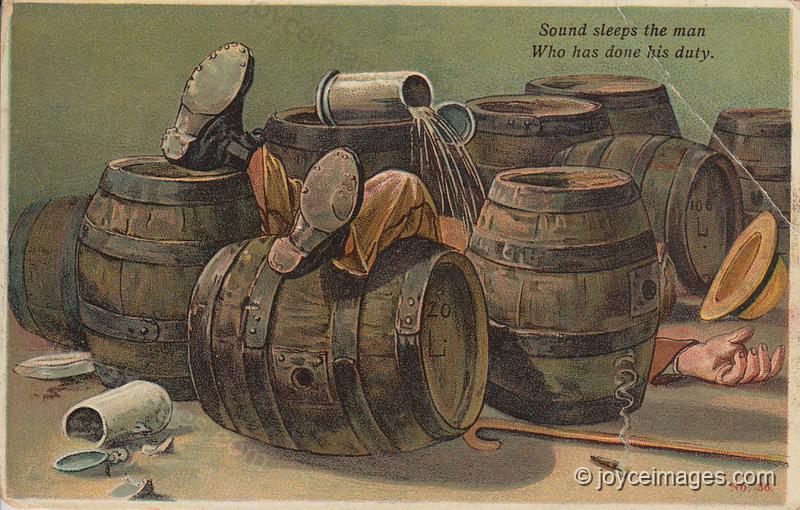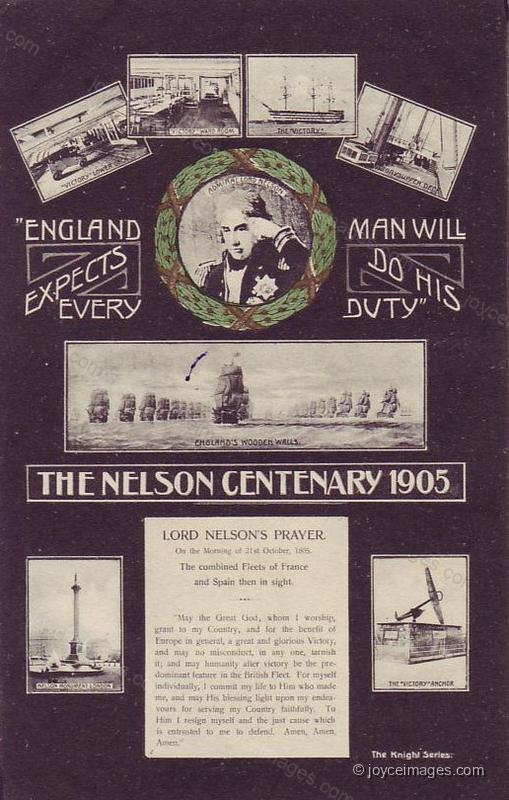"— The islanders, Mulligan said to Haines casually, speak frequently of the collector of prepuces." (U1.393)
"— How much, sir? asked the old woman.
— A quart, Stephen said." (U1.395)
Irish milksellers in a late 19c. SV.
— A quart, Stephen said." (U1.395)
Irish milksellers in a late 19c. SV.
"He watched her pour into the measure and thence into the jug rich white milk, not hers. Old shrunken paps. She poured again a measureful and a tilly. Old and secret she had entered from a morning world, maybe a messenger.
She praised the goodness of the milk, pouring it out. Crouching by a patient cow at daybreak in the lush field," (U1.397)
She praised the goodness of the milk, pouring it out. Crouching by a patient cow at daybreak in the lush field," (U1.397)
"a witch on her toadstool, her wrinkled fingers quick at the squirting dugs. They lowed about her whom they knew, dewsilky cattle. Silk of the kine and poor old woman, names given her in old times." (U1.401)
"A wandering crone, lowly form of an immortal serving her conqueror and her gay betrayer, their common cuckquean, a messenger from the secret morning. To serve or to upbraid, whether he could not tell: but scorned to beg her favor.
- It is indeed, ma'am, Buck Mulligan said, pouring milk into their cups.
- Taste it, sir, she said.
He drank at her bidding." (U.1.404)
- It is indeed, ma'am, Buck Mulligan said, pouring milk into their cups.
- Taste it, sir, she said.
He drank at her bidding." (U.1.404)
"- If we could live on good food like that, he said to her somewhat loudly, we wouldn't have the country full of rotten teeth and rotten guts." (U3.411)
"Living in a bogswamp, eating cheap food and the streets paved with dust, horsedung and consumptives' spits." (U1.412)
"- Are you a medical student, sir? the old woman asked.
- I am, ma'am, Buck Mulligan answered.
- Look at that now, she said." (U1.415)
- I am, ma'am, Buck Mulligan answered.
- Look at that now, she said." (U1.415)
"She bows her old head to a voice that speaks to her loudly, her bonesetter, her medicineman:" (U1.418)
"me she slights. To the voice that will shrive and oil for the grave all there is of her but her woman's unclean loins, of man's flesh made not in God's likeness, the serpent's prey. And to the loud voice that now bids her be silent with wondering unsteady eyes.
- Do you understand what he says? Stephen asked her.
- Is it French you are talking, sir? the old woman said to Haines." (U1.419)
- Do you understand what he says? Stephen asked her.
- Is it French you are talking, sir? the old woman said to Haines." (U1.419)
"Haines spoke to her again a longer speech, confidently.
— Irish, Buck Mulligan said. Is there Gaelic on you?
— I thought it was Irish, she said, by the sound of it. Are you from the west, sir?
— I am an Englishman, Haines answered.
— He's English, Buck Mulligan said, and he thinks we ought to speak Irish in Ireland.
— Sure we ought too, the old woman said, and I'm ashamed I don't speak the language myself. I'm told it's a grand language by them that knows.
— Grand is no name for it, said Buck Mulligan. Wonderful entirely. Fill us out some more tea, Kinch. Would you like a cup, ma'am?" (U1.426)
— Irish, Buck Mulligan said. Is there Gaelic on you?
— I thought it was Irish, she said, by the sound of it. Are you from the west, sir?
— I am an Englishman, Haines answered.
— He's English, Buck Mulligan said, and he thinks we ought to speak Irish in Ireland.
— Sure we ought too, the old woman said, and I'm ashamed I don't speak the language myself. I'm told it's a grand language by them that knows.
— Grand is no name for it, said Buck Mulligan. Wonderful entirely. Fill us out some more tea, Kinch. Would you like a cup, ma'am?" (U1.426)
"—No, thank you, sir, the old woman said, slipping the ring of the milkcan on her forearm and about to go.
Haines said to her:
— Have you your bill? We had better pay her, Mulligan, hadn't we?
Stephen filled again the three cups.
— Bill, sir? she said, halting. Well, it's seven mornings a pint at twopence is seven twos is a shilling and twopence over and these three mornings a quart at fourpence is three quarts is a shilling. That's a shilling and one and two is two and two, sir.
Buck Mulligan sighed and, having filled his mouth with a crust thickly buttered on both sides, stretched forth his legs and began to search his trouser pockets." (U1.437)
Haines said to her:
— Have you your bill? We had better pay her, Mulligan, hadn't we?
Stephen filled again the three cups.
— Bill, sir? she said, halting. Well, it's seven mornings a pint at twopence is seven twos is a shilling and twopence over and these three mornings a quart at fourpence is three quarts is a shilling. That's a shilling and one and two is two and two, sir.
Buck Mulligan sighed and, having filled his mouth with a crust thickly buttered on both sides, stretched forth his legs and began to search his trouser pockets." (U1.437)
"—Pay up and look pleasant, Haines said to him, smiling.
Stephen filled a third cup, a spoonful of tea colouring faintly the thick rich milk." (U1/449)
Stephen filled a third cup, a spoonful of tea colouring faintly the thick rich milk." (U1/449)
"Buck Mulligan brought up a florin, twisted it round in his fingers and cried:
- A miracle!
He passed it along the table towards the old woman, saying:
- Ask nothing more of me, sweet.
All I can give you I give.
Stephen laid the coin in her uneager hand.
- We'll owe twopence, he said.
- Time enough, sir, she said, taking the coin. Time enough. Good morning, sir.
She curtseyed and went out, followed by Buck Mulligan's tender chant:
- Heart of my heart, were it more,
More would be laid at your feet." (U1.451)
- A miracle!
He passed it along the table towards the old woman, saying:
- Ask nothing more of me, sweet.
All I can give you I give.
Stephen laid the coin in her uneager hand.
- We'll owe twopence, he said.
- Time enough, sir, she said, taking the coin. Time enough. Good morning, sir.
She curtseyed and went out, followed by Buck Mulligan's tender chant:
- Heart of my heart, were it more,
More would be laid at your feet." (U1.451)
"He turned to Stephen and said:
- Seriously, Dedalus. I'm stony. Hurry out to your school kip and bring us back some money. Today the bards must drink and junket." (U1.465)
- Seriously, Dedalus. I'm stony. Hurry out to your school kip and bring us back some money. Today the bards must drink and junket." (U1.465)
"Ireland expects that every man this day will do his duty." (U1.467)
"England expects that every man will do his duty" was a message sent in signal by Lord Horatio Nelson to the British fleet, minutes before the Battle of Trafalgar, October 21st 1805. The battle of Trafalgar was the most decisive naval engagement of the Napoleonic Wars. Lord Nelson lost his life in it.
In 1811, the tenor John Braham composed a song, 'The Death of Nelson', that immediately became immensely popular throughout the British Empire. It included the words of the signal, but they were altered to "England expects that every man this day will do his duty" to fit the metre. Mulligan quotes the adulterated version.
"England expects that every man will do his duty" was a message sent in signal by Lord Horatio Nelson to the British fleet, minutes before the Battle of Trafalgar, October 21st 1805. The battle of Trafalgar was the most decisive naval engagement of the Napoleonic Wars. Lord Nelson lost his life in it.
In 1811, the tenor John Braham composed a song, 'The Death of Nelson', that immediately became immensely popular throughout the British Empire. It included the words of the signal, but they were altered to "England expects that every man this day will do his duty" to fit the metre. Mulligan quotes the adulterated version.
